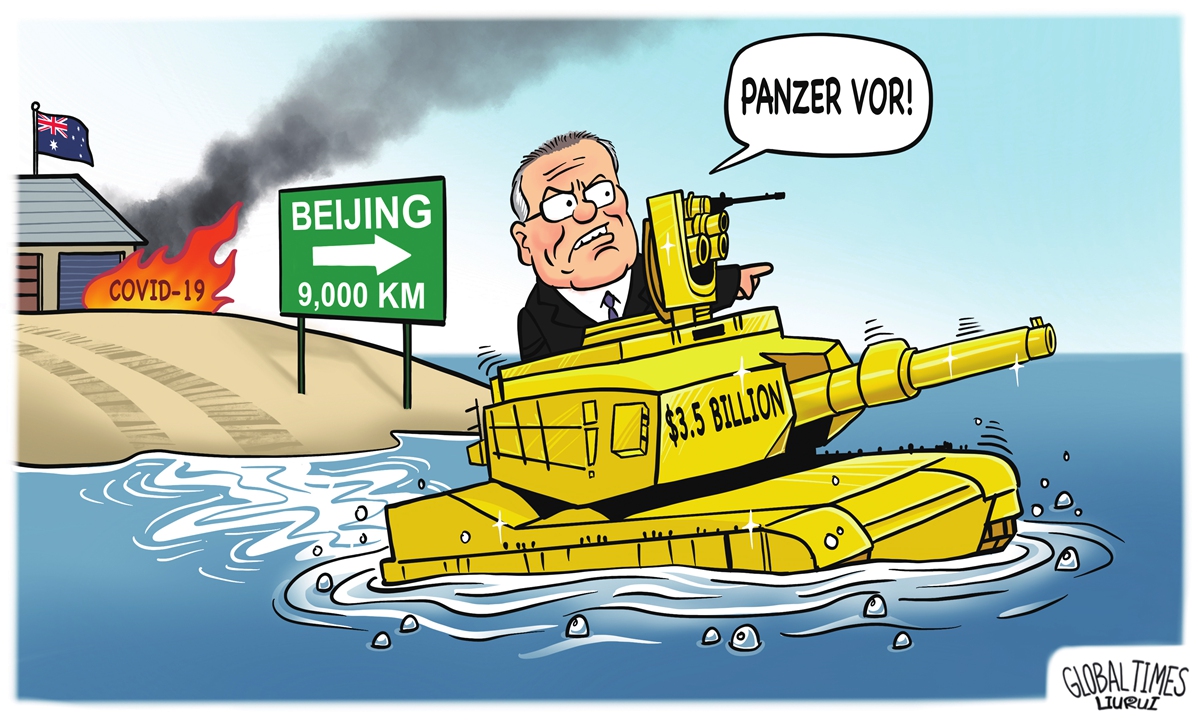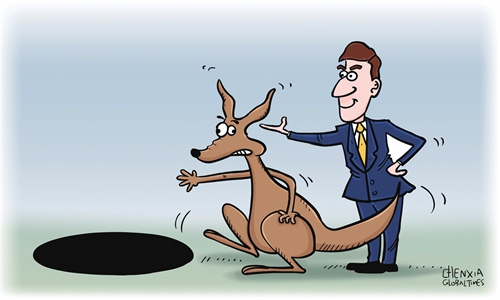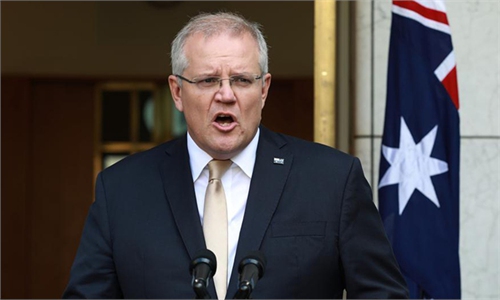Canberra's China delusion a bellicose display adding to Australia's unpredictability

Panzer Vor! Illustration: Liu Rui/Global Times
After Australia's highly controversial plan to build up a fleet of at least 12 nuclear-powered submarines, announced in September 2021 with the establishment of the AUKUS alliance, Canberra has unusually quickened the pace to further upgrade and expand its all-round military capacity.On December 13, Australia signed a A$1 billion ($717 million) contract with South Korea which would supply the Australian armed forces with advanced self-propelled howitzers and ammunition resupply vehicles. On January 6, Australian Prime Minister Scott Morrison signed the Reciprocal Access Agreement with his Japanese counterpart Fumio Kishida, which would see the two countries' armies work more closely in military exercises, training, logistics and joint operations. In a breathtaking maneuver, Australian Defense Minister Peter Dutton announced on Monday that Australia would purchase from the US a convoy of more than 120 tanks and other armored vehicles which, according to observers, would be used to engage in "'close combat' in urban environments."
Australia's recent militaristic frenzy is believed to be part of an aggressive scheme to work in active conjunction with the US' Indo-Pacific Strategy, which is supposed to buttress the US' regional and global hegemony and suppress and thwart China's development.
Since mid-2017, Canberra has been spearheading Washington's anti-China campaign, wantonly trashing the mutually beneficial comprehensive strategic partnership between China and Australia. Bilateral relations have been sustaining unprecedented damages, hitting an all-time low with no clear prospect of improvement in sight.
With a relentless mulishness, Australia appears to be headstrong on a militaristic path with China, positioned as its avowed adversary.
This series of hawkish maneuvers reflect the ambitious geopolitical aspirations harbored by some politicians in Canberra. Since its early start as a British penal settlement, Australia had been acting as a loyal adherent to the national interest of the UK. After World War II, it switched its political and security allegiance to the US, acting as a subordinate pawn in almost all of Washington's military and political operations.
However, in recent years, we have been observing a new tactic trajectory in which Australia becomes less and less content with its traditional foot soldier's role in the strategic games of major powers. From Barack Obama's "pivot to Asia" to Donald Trump and Joe Biden's "Indo-Pacific Strategy," Australia seems to have recognized a delusory prospect to be able to boost up its strategic importance by provoking and confronting China.
Such ominous ambition can be dangerous, as witnessed in Canberra's increasingly bellicose rhetoric and acts. Some Australian politicians have been contriving to stir up tensions with China at every opportunity. Warmongering cacophony has been luridly resounding in the land Down Under, with saber-rattling battle cries menacing that "the drums of war are beating" for Australia to engage in military confrontations with China.
Australia seems to have identified a new strategic goal, which is to act as a regional small power in the Asia-Pacific. That is why, in recent years, Canberra has been desperately advancing its Pacific Step-up strategy, and frenetically trying to edge out China's presence and interest in the South Pacific. Australia's blatant meddling efforts in the South China Sea, the Taiwan Straits, and other Chinese domestic affairs are all part of its agenda to become a regional "mini hegemon."
Australia's foreign policy has been a mixture of opportunism and adventurism. Recklessness and miscalculation often characterize its international outlook and tactics. Canberra seems to be fatally misguided with the false notion that by beefing up Australia's military might, China could be overawed and intimidated, adding to Canberra's strategic weight in the international arena.
China does not oppose Australia's aspirations to play a more important role in the international multilateral political power structure. However, Morrison and his administration seem to be indulging in their own delusion that Australia would become strategically more prominent by assertively and aggressively challenging China. As a matter of fact, such wishful thinking could simply crystallize into dangerous acts of fire-playing jingoism, and bring about disastrously wanton acts of military clashes.
In the face of Australia's increasingly erratic unpredictability, China is more vigilant of the possible risks, and ready to take resolute decisive measures to deter threats and protect its national interest.
The author is a professor and director of the Australian Studies Centre, East China Normal University. opinion@globaltimes.com.cn



